1). “ 'Legitimate Rape': They are passing laws, not to make sure rape victims get justice, but to make sure rape victims give birth”, May 15, 2024, Jess Piper, The View from Rural Missouri by Jess Piper, at < https://jesspiper.substack.
2). “America has a child marriage epidemic—and it's even worse than you think: With more than 300,000 documented child marriages since 2000, Republicans are fighting to keep it that way”, May 15, 2024, Qasim Rashid, Let's Address This with Qasim Rashid, at < https://qasimrashid.substack.
3). “Why Are Some Republican Lawmakers Hellbent on Preserving Child Marriage?: GOP lawmakers across the U.S. have opposed raising the marriage age, with some arguing child marriage bans would encourage abortion”, May 11, 2024, Tessa Stuart, Rolling Stone, at < https://www.rollingstone.com/
4). “New Hampshire moves to ban child marriage despite lawmaker calling teens ‘ripe and fertile’: State Rep. Jess Edwards said the law could increase abortions when marriage could be better for a 'freedom-loving couple.' ”, May 7, 2024, Molly Farrar, Boston.com, at < https://www.boston.com/news/
5). “New Hampshire Republican State Rep. Jess Edwards arguing in favor of child marriage”, May 4, 2024, Jesse Craton 'Jess' Edwards, Jr. makes a statement opposing a new law to restrict Child Marriage to the New Hampshire House of Representatives, Politics of the NWO, duration of video 0:53, at < https://www.youtube.com/watch?
6). “United States’ Child Marriage Problem: Study Findings (April 2021)”, April 2021, Anon, Unchained at Last, at < https://www.unchainedatlast.
7). “Help End Child Marriage: UNICEF USA is working with partners to put an end to child marriage in the United States. Learn more and how to help”, 2023, Anon, U.S. Fund for UNICEF d/b/a UNICEF USA, at < https://www.unicefusa.org/how-
~~ recommended by dmorista ~~
Introduction: There was a time when making crazed vicious statements about women who have been raped actually had negative political consequences for the candidate even in the Republican Party. This is discussed in Item 1)., “ 'Legitimate Rape': ….”, by Jess Piper, among other issues. She pointed out that in 2012 the Rethug candidate for the U.S. Senate, Todd Akins:
“During an interview in 2012 at a St. Louis television station, Todd Akin was asked by reporter Charles Jaco whether abortion should be legal for women who have been raped. Akin replied with this:
“ 'From what I understand from doctors, that’s really rare,' Akin said, referring to pregnancy resulting from rape. 'If it’s a legitimate rape, the female body has ways to try to shut that whole thing down.' (Emphasis added)
“Akin also said he would prefer that punishment for rape be 'focused on the rapist and not attacking the child.'
“That did it. Those statements sealed the deal for so many voters in Missouri. Akin tried to walk them back and apologized. He even said he misspoke. It didn’t matter to Missouri voters — he paid for those comments by losing the race and becoming a sort of meme for extremism.
“That was 2012. Today, those statements likely wouldn’t lose a race or even raise many eyebrows in the GOP, especially not in Missouri. We have become nearly numb to the constant barrage of inaccurate, insensitive, and invasive line of comments and laws against women in this state.” (Emphasis added)
Piper goes on to list 5 statements at least as outrageous made more recently by Rethug politicians in Missouri that raised not the slightest peep of criticism.
Then in Item 2)., “America has a child marriage epidemic ….”, the author reviews a significant amount of information about Child Marriage in the U.S. This includes a photo of a faux Child Wedding held in New York State.
Then in Item 3)., “Why Are Some Republican Lawmakers Hellbent ….” and Item 4)., “New Hampshire moves to ban child marriage ….”, the two articles both point out that many Republican legislators, across as variety of Red and even some Blue States, are supporters of Child Marriage. This is part of their overall desire to control women and support for forced-birth / forced-pregnancy policies. Items 2 and 4 have embedded youtube links that show New Hampshire House of Representatives member Jesse Craton "Jess" Edwards, Jr. speaking on the floor of the New Hampshire House during debate about a bill to end Child Marriage. He advocates for Child Marriage stating that many girls under 18 years of age are “Ripe and Fertile”. Item 5). “New Hampshire Republican ….” is nothing but a 53 second long youtube of Craton's repulsive statement. Edwards whined after getting 800 negative comments via various communication media, of which only 3 were what he termed “soft” death threats. We might note that various liberal figures received hundreds or thousands of very “hard” death threats, and in some cases had reactionaries and fascist toting AR-15s lurking around their homes throughout the night for weeks at a time. Poor little Jesse Craton "Jess" Edwards, Jr., well if you can't take the heat stay out of the kitchen. In fact it turns out that Edwards did not just utter “a single inappropriate word on the House floor”; but rather as someone pointed out in one of the 800 negative contacts he complained about, he has been an advocate of very creepy relationships between older men and “young ripe and fertile women/girls”. Be sure to read the first 2 paragraphs of Figure 2 here below, to see the statement that Edwards had posted many times text supporting Child Marriage. And the 800 negative comments include many
Edwards posted this whiney statement about the reception his loathsome comments prompted:
“Jess Edwards, Rock 4 NH Representative May 7 at 8:55 PM
“If you've noticed anything odd about my Facebook since Friday, like unhappy faces of fantastic photos of family, it's because I've become a target of a left-wing cancel culture movement that crosses the nation and includes some international sources. I've received about 800 negative contacts via email, Facebook, phone and text.
“Tonight, I had to file a police report with Auburn. I have received three 'soft' death threats that are meant to intimidate me or maybe scare me. I blew off the first two even though the second one was a little location specific. The third one was very location specific though and more ominous. I won't share the messages because I only know a TV show level of protecting evidence.
“If you want to know what would incite the mob behavior, this article describes some context.
“Social media is weaponized. A democrat rep pointed it at me on Reddit and pulled the trigger. I accept responsibility for selecting a single inappropriate word on the House floor Thursday. The violent reaction isn't proportionate though.”
The responses were overwhelmingly just disgusted and outraged comments about the pedophilic nature of a 52 year-old man and his remarks about underage girls. And includes the following excerpts:
N.H. lawmaker opposes new marriage bill, says teens are of ‘ripe, fertile’ age
Soni Dae: No, it’s because you said children who were sexually assaulted should be married to their rapists.
Elizabeth Burton: Maybe you shouldn’t have described 16 year olds as “ripe and fertile”
Elizabeth Burton: Jess Edwards, Rock 4 NH Representative a lot of people have pretty strong opinions regarding pedophiles. How many trans people and drag queens have gotten death threats for “grooming children” yet I’ve NEVER heard them say any kind of language like that. EVER. And “ripe and fertile” regarding 16 yo GIRLS, especially spoken by an old man like you is pretty pedophile coded. Odd that your brain came up with THAT word choice. Freudian slip? Better to marry off CHILDREN than have an abortion? That’s some handmaids tale bs right there. Prolife? For who? Not the 16 year old. She can sit in her red dress and reap what she sowed. All that’s missing is you asking what she was wearing. Gross.
Laura Costa Harrelson: I'm 71 and hearing a 52 year old man refer to 16 year-olds as ripe and fertile is vile and disgusting. This isn't mob effect, red/blue, leftwing culture or needing critical thinking skills. Hearing a 52 year old man making ripe and fertile statements about young women is disgusting and creepy. Do you think that? Is that why you are saying what you think out loud? We are listening and we are disgusted by you. A 16 year old should be enjoying high school not burdened with motherhood. You don't understand because you're a man and are not capable of giving birth, therefore you have no knowledge on the subject. You're crying because you made a stupid statement. You know it is stupid because of all the calls, emails and messages you have received. The cat is out of the bag and you let it out. We know what you think about young women. Thank you.
Finally Item 6)., “United States’ Child Marriage Problem: ….”, and Item 7)., “Help End Child Marriage: ….”, both discuss the nearly completely obscured and ignored problem of the exploitation of girls, that is inherent in Child Marriage in the U.S. A useful map to help understand the depths of this problem is posteed here below.
The problem of the exploitation and trafficking of girls is generally presented as a problem of criminal gangs, or the forced-birth movement constantly tries to label helping women and girls obtain safe abortions as trafficking. But a significant part of the exploitation of girls is protected by laws that carry on the traditions of earlier strictly patriarchal times.
"Legitimate Rape"
I am not going to make you wonder what this essay is about — the extremism in the Missouri Republican party. This extremism is laser focused on women and girls. To demonstrate how extreme they have become, I only have to take you back a decade.
Remember: Missouri is a testing ground for the rest of America. What they have done to us, is meant for you too.
Missouri State Capitol, Jefferson City
Do you remember Todd Akin? He was the Missouri Republican who won the nomination for US Senate, but was beaten soundly by Claire McCaskill in 2012. Do you remember why the race was tilted toward Claire during the last few weeks of the campaign?
During an interview in 2012 at a St. Louis television station, Todd Akin was asked by reporter Charles Jaco whether abortion should be legal for women who have been raped. Akin replied with this:
“From what I understand from doctors, that’s really rare,” Akin said, referring to pregnancy resulting from rape. “If it’s a legitimate rape, the female body has ways to try to shut that whole thing down.”
Akin also said he would prefer that punishment for rape be “focused on the rapist and not attacking the child."
That did it. Those statements sealed the deal for so many voters in Missouri. Akin tried to walk them back and apologized. He even said he misspoke. It didn’t matter to Missouri voters — he paid for those comments by losing the race and becoming a sort of meme for extremism.
That was 2012. Today, those statements likely wouldn’t lose a race or even raise many eyebrows in the GOP, especially not in Missouri. We have become nearly numb to the constant barrage of inaccurate, insensitive, and invasive line of comments and laws against women in this state.
Let me show you a few things that Missouri Republican lawmakers have stated publicly that have netted exactly zero response from the party.
The horrifying reality for Missouri victims of sexual assault? Senate Republicans blocked attempts to add rape and incest exemptions to Missouri’s abortion ban. Amendments to legalize abortion in cases of rape or incest, added by Missouri Senate Democrats, were voted down by Missouri GOP lawmakers in February, 2024.
In statements about their refusal to allow exemptions, the comments I’ll provide show that not only have GOP lawmakers become heartless in their focus on punishing victims, the statements also prove that GOP lawmakers are not scared to say the things that would have had them voted out of office just a decade ago.
Senator Rick Brattin, (R) Harrisonville, explained his vote against adding rape and incest exemptions to the Missouri abortion ban. He argued that being forced to carry their rapist’s baby could be “healing” for rape and incest victims.
“If you want to go after the rapist, let’s give him the death penalty. Absolutely, let’s do it,” Brattin said. “But not the innocent person caught in-between that, by God’s grace, may even be the greatest healing agent you need in which to recover from such an atrocity.”
Wait. Forced birth is the greatest healing agent for the trauma of rape? That is a disgusting statement. And, the death penalty for rape? Not only is no one getting the death penalty for rape, but there are so many rapes that aren’t even being prosecuted.
The Kansas City Star reported that Missouri’s backlog of untested sexual assault kits has grown by 380% in the last 5 years. How would anyone get any penalty for rape when rape kits aren’t even processed?
Senator Sandy Crawford, a Buffalo Republican, pushed back on adding exemptions for rape or incest to the Missouri abortion ban saying this:
“While rape would be mentally taxing for anyone, it doesn’t justify an abortion. God is perfect. God does not make mistakes and for some reason he allows that (rape) to happen. Bad things happen.”
First of all, whose god? Second, rape is more than “mentally taxing” and making excuses for rape by saying it’s god’s will is something I hope I never have to read again.
Representative Jeff Farnan, a freshman legislator from Stanberry, said this about abortion exemptions:
“Well, what about rape or incest? I still believe that is a baby. I really feel for these mothers that are going through this situation. I could never imagine what they’re going through. But there are a lot of resources out there for them that they could utilize…they have counseling there, they have adoption options that they can go through.”
Jeff’s attitude toward rape? Sorry if that happens to you ladies, but there’s always adoption. Except, it’s not that easy; adoption can bring its own set of trauma, and there are currently over 14,000 kids in the Missouri foster system. 14,000 kids waiting for a home.
One Missouri State Representative, Hardy Billington of Poplar Bluff, actually used the abortion question to push back on outlawing child marriage…yes, you read that right. He thinks child marriage should be legal. He is quoted as saying:
“My opinion is that if someone (wants to) get married at 17, and they’re going to have a baby and they cannot get married, then…chances of abortion are extremely high,”
That quote sounds super predator-like, and abortion is banned in Missouri — he should remember that because he voted to ban it.
I am at a loss nearly every day. It’s hard to raise daughters in this state. I wonder if it’s even ethical at this point?
Missouri has slowly been pushed to the edge of extremism. We are the frog in the pot. We have been looking around and trying to use reason to say, “this can’t be happening.” We wonder if these lawmakers are just making missteps — just a quote taken out of context or an off the cuff remark that they didn’t mean. Surely they don’t mean the things they say?
No, they do. They mean the things they say. They prove it by the bills they propose and the bills they vote against.
The water is boiling and still some of us sit and ponder. It’s past time to jump, friend. The best thing we can do is speak out about what we see and tell everyone we know what is happening in our state.
One of the most courageous things we can do is to point out what the GOP is saying and doing and be loud about it.
We warn others. We save ourselves by warning the country.
~Jess
My name is Jess and I was a high school Literature teacher for 16 years until I decided to run as a Democrat in a rural, red district in Missouri. I bring you news and politics from Missouri and beyond from a rural progressive point of view.
xxxxxxxxxxxxxxxxxxxxx
America has a child marriage epidemic—and it's even worse than you think
Children today have it tough, between grades, drugs, alcohol—and apparently, the threat of child marriage. This isn’t hyperbole. To this day in 2024, thousands of children are beholden to, obliged to, forced into, (what’s the right word here?) child marriage in the United States—and Republicans seem to want to keep it that way. With several thousand documented child marriages every single year—some involving as children as young as 10—we need need legislative solutions and penalties for those who exploit children. But where do we begin? Let’s Address This.
First, let’s truly understand how bad this epidemic is in the United States. Despite widespread condemnation and international treaties against it, child marriage continues in the United States unabated. As reported in numerous outlets including the Washington Post and The Independent:
At least 207,468 minors married in the US between 2000 and 2015, according to data compiled by Unchained At Last, a group campaigning to abolish child marriage, and investigative documentary series Frontline. The true figure is likely to be much higher because 10 states provided no or incomplete statistics.
The youngest wedded were three 10-year-old girls in Tennessee who married men aged 24, 25 and 31 in 2001. The youngest groom was an 11-year-old who married a 27-year-old woman in the same state in 2006. Children as young as 12 were granted marriage licences in Alaska, Louisiana and South Carolina, while 11 other states allowed 13-year-olds to wed. More than 1,000 children aged 14 or under were granted marriage licences.
And the problem persists. Unchained At Last conducted another study in 2021 and found more than 300,000 documented cases of child marriage, as reported by Rolling Stone:
A 2021 study by the advocacy group Unchained at Last found that 300,000 minors were married between 2000 and 2018 in the United States. According to the group, 60,000 of those marriages involved an age difference that would have otherwise been considered a sex crime.
Remember, this is yet incomplete data as 10 states do not adequately report this data. But there’s yet another element of horror to this situation. In many states, children who are married cannot divorce—making child marriage a daunting one way ticket. As divorce lawyer Nancy Zalusky Berg explains:
A minor can’t file for a divorce because they’re not considered old enough to do it. That’s because marriage is considered a contract, and most laws stipulate that only adults can enter into contracts. So, if a minor wants to change their marriage contract, they need an adult to help them do it.
Next, let’s understand the lead culprits perpetuating this injustice. Because while child marriage is a nationwide problem, Republican states lead the way. Nine of the top 10 states leading rates of child marriage are GOP run states. They are as follows:
1. Nevada (0.671%)
2. Idaho (0.338%)
3. Arkansas (0.295%)
4. Kentucky (0.262%)
5. Oklahoma (0.229%)
6. Wyoming (0.227%)
7. Utah (0.208%)
8. Alabama (0.195%)
9. West Virginia (0.193%)
10. Mississippi (0.182%)
This epidemic persists under the radar, often defended and protected by lawmakers, particularly within the Republican Party, who cite tradition, religion, and a shocking misinterpretation of maturity and readiness. The latest absurd argument is that child marriage is better than abortion—notwithstanding that states that ban abortion also suffer at least a 24% increase in maternal mortality and have the highest rate of infant mortality as well. Facts just aren’t the Republican’s thing—controlling women and children, is.
West Virginia and Wyoming Republicans have also launched efforts to protect child marriage. And in New Hampshire, as recently as 2018, child marriage was legal for girls as young as 13 and boys as young as 14. This is particularly concerning because about 86% of child marriages are of young girls to male adults. Worse, efforts to ban child marriage in New Hampshire faced opposition from legislators when 174 Republicans voted against a bill to ban child marriage. One Republican lawmaker, State Representative Jess Edwards, described teen girls as “ripe and fertile,”—horrifying remarks that I address below:
Missouri tells a similar story, where Republicans continue to block attempts to raise the marriage age by arguing for “parental rights and traditional values,” regardless of the immense harm to children. As reported by the Missouri Independent:
The current law allows children aged 16 and 17 to marry with parental consent and younger children to marry with a judge’s approval. Until the legislature voted to raise the minimum marriage age to 16 in 2018, Missouri had among the most lenient child marriage laws in the nation — making it an especially popular state for 15-year-olds to travel to be married. Despite the 2018 change, Missouri law still does not align with international human rights standards, which set the minimum age at 18. [A]round 70 minors every year are entered into marriage in Missouri.
And the fact is, this hypocrisy extends beyond child marriage. The Republican Party, which often claims to champion the protection of children, also supports policies that endanger and undermine the well-being of minors. They are proponents of child labor laws, opponents of free school lunches for children, adversaries of the child tax credit, and critics of Medicaid expansion, which disproportionately benefits low-income children. I made this point in a viral tweet last year, its virality indicating that many people see this hypocrisy for the cruel reality that it is.
But surely there are international laws that ban child marriage, right? Well, it’s sort of a good news/bad news situation. The good news is yes, there are international laws and treaties that ban child marriage. For example, the Convention on the Elimination of All Forms of Discrimination Against Women (CEDAW) calls for action to specify a minimum marriage age of 18. Therefore, any U.S. state law which forces minors into marriage is a de facto violation of CEDAW. The tragic bad news is that while 186 of 193 countries have ratified the CEDAW treaty, the United States shamefully remains as one of only seven countries that has to date refused to ratify it. We join Iran, Sudan, Somalia, Nauru, Palau, and Tonga on this indefensible list. Therefore, CEDAW does not apply in the United States. Meanwhile, no Federal legislation exists to ban child marriage in the United States either.
Finally, let’s talk solutions. Because, all of the above notwithstanding, Democrats aren’t off the hook either, and must do better. As documented by UNICEF, only Connecticut, Delaware, Massachusetts, Michigan, Minnesota, New Jersey, New York, Pennsylvania, Rhode Island, Vermont, and Washington have banned child marriage under the age of 18. That leaves 39 states where child marriage is still legal and recognized. It’s long past time for change. Children forced into child marriages are often helpless, but we as adults, are not. So what can you do?
The leading organization to help pass bans on child marriage is Unchained At Last. Visit their website, sign up for their newsletter, and if you can, contribute to their cause. Likewise, call upon your lawmakers to end this harmful practice and align with modern standards of human rights and dignity. We can do so by pressuring state lawmakers to ban child marriage on the state level, pressure federal lawmakers to pass national legislation banning child marriage (and let the Supremacy Clause quash all child marriage laws), and pressure the White House and Congress to ratify CEDAW and bring the United States up to speed with the vast majority of humanity.
Experts estimate that in 2024, roughly 50 minors will be forced into a child marriage every week in the United States. That number must come down to zero. It is critical we continue to speak up, create more awareness, and bring about this life saving change for human rights in the United States.
xxxxxxxxxxxxxxxxxxxxxxxxxxxxxxx
Why Are Some Republican Lawmakers Hellbent on Preserving Child Marriage?

Holly Thompson Rehder was a sophomore when she dropped out of high school and married her 21-year-old boyfriend. Today, she’s a GOP state senator and the sponsor of a bill that would ban child marriage in Missouri — a bill that she has been surprised to see blocked by her Republican colleagues who argue there is nothing wrong with the practice.
“I know firsthand. I was married at 15. My sister was married at 16. My cousin was married at 16,” Rehder says. “I understand how a teenage girl being married off is harmful to her life, and sometimes that’s hard for others who haven’t seen that, up close and personal, to understand.”
Marriage is currently legal in Missouri at age of 16 with at least one parent’s consent. That’s a relatively recent development: Missouri lawmakers only banned marrying children who were 14 years old or younger in 2018. Fifty lawmakers — 38 Republicans and two Democrats — voted against that bill at the time. Before the 2018 legislation passed, Missouri had one of the laxest child marriage restrictions in the country, which, some argued, made the state a refuge for sex trafficking.
Rehder, along with state Sen. Lauren Arthur (D), introduced a bill that would outlaw marriage for anyone under the age of 18. The bill, which passed the GOP-controlled Senate 31-1 earlier this year, has stalled in House — the Government Efficiency and Downsizing committee, specifically — where half of the committee’s 14 members have opposed it.
Among the bill’s opponents is Rep. Hardy Billington (R), who told the Kansas City Star he believes that ending child marriage in Missouri would encourage abortion. “My opinion is that if someone [wants to] get married at 17, and they’re going to have a baby, and they cannot get married, then… chances of abortion are extremely high,” Billington said. (Missouri bans abortion at any stage, except when the life of the pregnant person is at stake.)
This argument — that child marriage must be preserved to prevent abortion — seems to be gaining currency with Republicans across the country as they consider laws to raise the marriage age.
The 50 Worst Decisions in Movie History
The United States does not have a federal law setting the age of marriage. The marriage age is set by states, and only 12 of them have banned child marriage. (Those states: Connecticut, Delaware, Massachusetts, Michigan, Minnesota, New Jersey, New York, Pennsylvania, Rhode Island, Vermont, Virginia, and Washington.)
A 2021 study by the advocacy group Unchained at Last found that 300,000 minors were married between 2000 and 2018 in the United States. According to the group, 60,000 of those marriages involved an age difference that would have otherwise been considered a sex crime.
The vast majority of these minors were 16 or 17 years old, and most were girls wed to adult men who were four years older than they were, on average. There were five documented instances of children as young as 10 married in the U.S. in the period studied.
Several states legislatures have recently considered bills that would raise the marriage age recently — but they have run into opposition from Republican men who often cite abortion as the reason.
On the New Hampshire House floor last week, state Rep. Jess Edwards (R) argued against raising the marriage age from 16 to 18, by asking whether a law preventing people “of ripe, fertile age” from getting married would thus make “abortion a much more desirable alternative” than being pregnant out of wedlock. The bill, which had already passed the state Senate unanimously, narrowly made it through the House, with 192 votes in favor and 174 against. It now awaits the signature of Republican Gov. Chris Sununu.
Trump on Post-Roe Abortion Chaos: 'People Are Absolutely Thrilled'
Last year in West Virginia, a bill that would have raised the minimum age to obtain a marriage license passed the House of Delegates with overwhelming support, was defeated in the Senate Judiciary committee. Among the bill’s opponents was Republican state Sen. Mike Stuart, who shared that his mother married at age 16, and gave birth to him six months later. “I’m the luckiest guy in the world,” he said. The proposal, which raised the marriage age to 16 with parental consent, was ultimately resurrected and signed into law.
In Wyoming last year, when state lawmakers were considering a bill to raise the minimum marriage age to 16, the Republican Party sent out an email citing talking points from the religious group Capitol Watch for Wyoming Families that asserted: “Since young men and women may be physically capable of begetting and bearing children prior to the age of 16, marriage MUST remain open to them for the sake of those children.” (The bill ultimately passed.)
Missouri’s Rehder, who became pregnant shortly after she was married at 15, doesn’t accept this argument. “I think there is no correlation” between child marriage and abortion, she says. “As a woman who was married at 15, who was pregnant at 15, you’re either pro-life or pro-choice. Your marriage status doesn’t have anything to do with either being pro-life or pro-choice.”
Another thing Rehder won’t accept? The possibility of her legislation dying in committee. While the bill that would raise the marriage age to 18 remains stalled with one week left in the legislative session, Rehder — who is currently running for lieutenant governor — has a plan to see it voted on next week.
Chris Stapleton and Dua Lipa Deliver Super Secret Duet at 2024 ACM Awards
“I’m tenacious, and I don’t give up until the last bell rings,” Rehder says. “I’ve got a bill that I’ve been working on [about] sex trafficking and foster children benefits. I’ve got it moving in the House, and I’m working to try to get this language for the marriage age added [as an amendment] to it.”
Rehder expects that bill, which has already passed out of committee, to come to the House floor on Monday, where she believes it might succeed. Proposing it as an amendment on the floor, she says, “will give us a larger pool of votes to pull from, and more women voting on it,” she says. “My hope is that we can still make this happen.”
xxxxxxxxxxxxxxxxxxxxxxxxxxx
New Hampshire moves to ban child marriage despite lawmaker calling teens 'ripe and fertile'
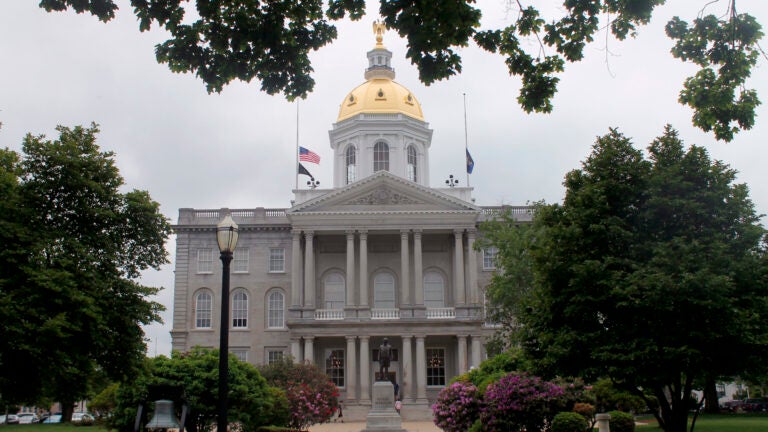
Lawmakers in New Hampshire last week passed a bill that would ban child marriage, despite one lawmaker going viral for arguing that a “ripe, fertile” teen could be more likely to have an abortion due to the ban.
The measure passed 192-174 and will head to Gov. Chris Sununu’s desk to be signed into law.
Sununu first raised the marriage age to 16 in 2018 — up from 13 for girls and 14 for boys. State Rep. Cassandra Levesque said she’s been working for a decade to end child marriage in the Granite State.
“Many, many people have worked with me to fight to End Child Marriage in NH. We have worked for years, researching, learning, listening, and advocating,” she wrote on X.” I will be forever grateful for them.”
Eleven other states have banned child marriage without any exceptions. Connecticut, Delaware, Massachusetts, Michigan, Minnesota, New Jersey, New York, Pennsylvania, Rhode Island, Vermont, and Washington have completely outlawed marriage before age 18, according to UNICEF.
Lawmaker refers to teens as “people who are of ripe, fertile age”
One lawmaker posed a question about the ban during a legislative session, captured in a viral video posted on X with more than 1.5 million views, asking if the ban would increase abortions among unmarried teenagers.
After State Rep. Jess Edwards referred to the minors involved as “ripe” and “fertile,” sounds of dissent can be heard from the crowd.
“If we continually restrict the freedom of marriage as a legitimate social option, when we do this to people who are of ripe, fertile age and may have pregnancy and a baby involved, are we not, in fact, making abortion a much more desirable alternative when marriage might be the right solution for some freedom-loving couple?” Edwards asked.
Edwards said on Facebook on Tuesday that he filed a police report after receiving three death threats over his viral comments.
“Social media is weaponized. A democrat rep pointed it at me on Reddit and pulled the trigger,” Edwards wrote. “I accept responsibility for selecting a single inappropriate word on the House floor Thursday. The violent reaction isn’t proportionate though.”
xxxxxxxxxxxxxxxxxxxxxx
xxxxxxxxxxxxxxxxxxxxx
United States' Child Marriage Problem: Study Findings (April 2021) - Unchained At Last
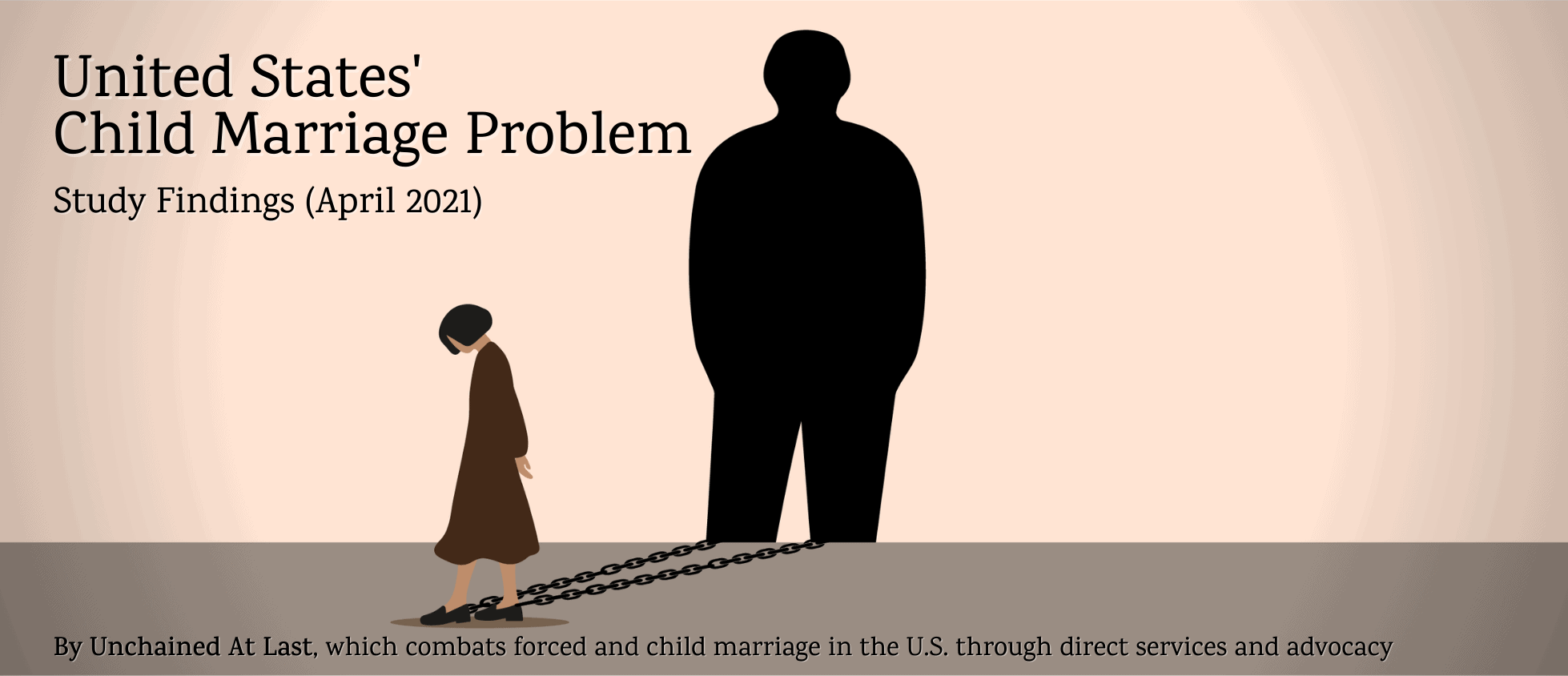
Unlike in countries where child marriage is illegal but persists anyway, the problem in the U.S. is the laws themselves. Most U.S. states still allow marriage before 18, and the four states* that banned it did so only in the last three years.
Federal law, too, allows and might even encourage child marriage. Immigration law does not specify a minimum age to petition for a foreign spouse or fiancé(e) or to be the beneficiary of a spousal or fiancé(e) visa, which allows for American girls to be trafficked for their citizenship and allows for children around the world to be trafficked to the U.S. under the guise of marriage. The U.S. approved nearly 9,000 petitions involving a minor between 2007 and 2017, and in 95% of them, the younger party was a girl. Further, the federal criminal code prohibits sex with a child age 12 to 15 but specifically exempts those who first marry the child. This incentivizes child marriage and implicitly endorses child rape.
Legislation to this effect harms no one except child rapists, costs nothing and protects children from a human rights abuse.
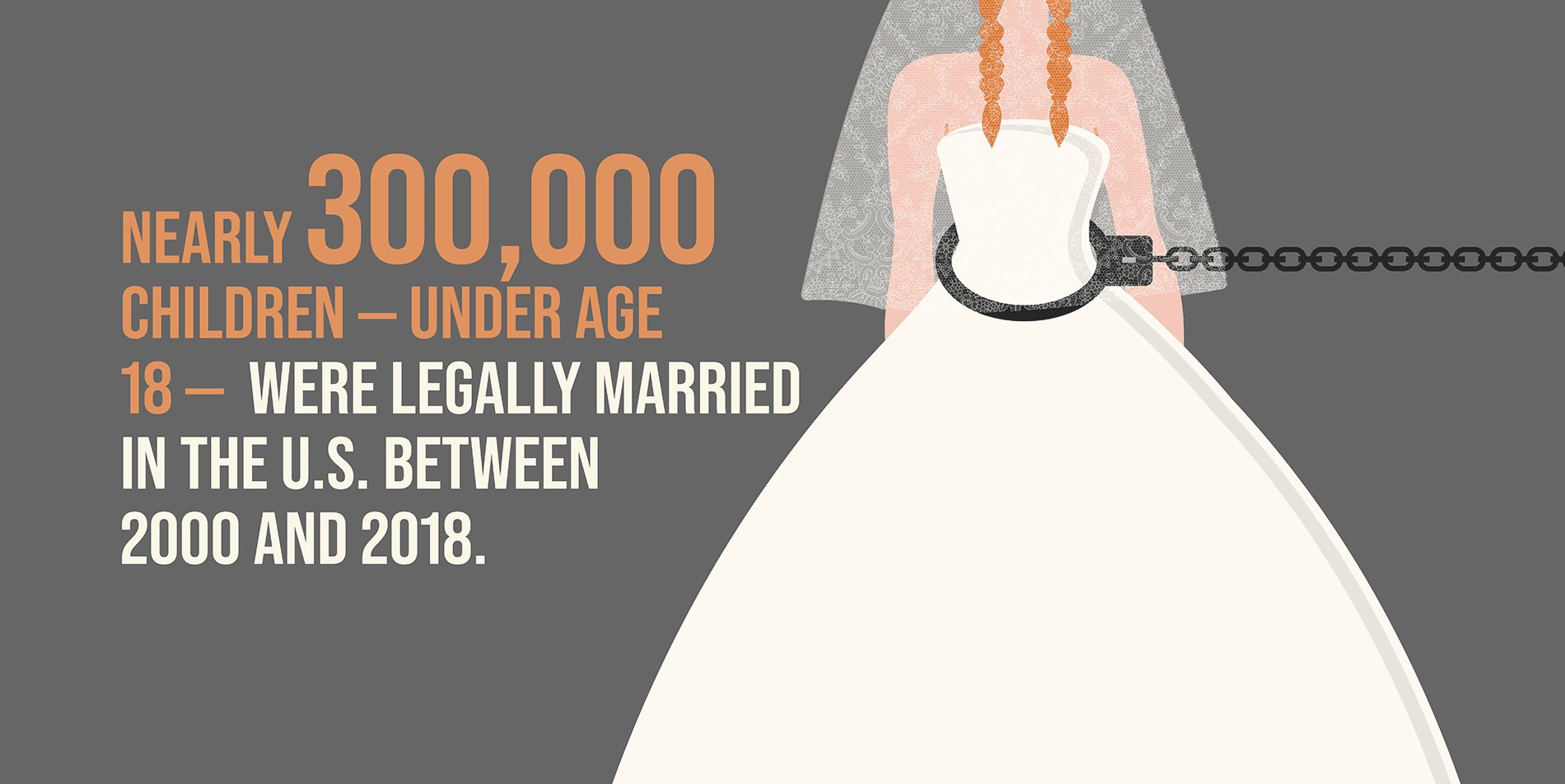
Background
Unchained At Last first realized in 2015 that the U.S. has a child marriage problem. Unchained had been founded in 2011 by a forced marriage survivor with a mission of providing free legal and social services to help individuals in the U.S. to escape forced marriages – but more and more girls, under age 18, were reaching out to Unchained to plead for the same help.
At the time, child marriage was legal in all 50 U.S. states, a fact that seemed lost on policymakers and advocates. Yet there is almost nothing Unchained can do to help a girl who is not yet 18 to escape a forced marriage. Even a day before her 18th birthday, a girl in the U.S. typically cannot leave home, enter a domestic violence shelter or even file for divorce.
Unchained launched a national movement to end child marriage with an op-ed article in the New York Times titled “America’s Child-Marriage Problem” [1]. Since then, Unchained and its allies have formed a National Coalition to End Child Marriage and various state coalitions, worked with state and federal legislators on simple policy solutions and studied and raised awareness of child marriage in the U.S.
Still, many Americans remain unaware of the prevalence of child marriage in the U.S. [2], possibly because of significant data deficiencies. No central repository collects national marriage-age data in the U.S., and some states do not track this information or make it available.
This is the first study of the extent of child marriage in the U.S. that collected all available state data and used various estimation methods, based on high correlations identified between the available data and census data, to fill in the data gaps. (Unchained’s previous study of the extent of child marriage in the U.S. for the period 2000 to 2010 was based on available data from 38 states plus estimates for the other 12 states based only on state population [3]. PBS Frontline later extended that study to 2015 but did not attempt to fill in the many data gaps left by states that provided no data or only some data [4]).
Unchained led the study, which was funded by the Bill & Melinda Gates Foundation. Unchained partnered with McGill University, Quest Research & Investigations, Quantitative Analysis and others. (See Appendix A for a full list of Unchained’s partners for this study.)
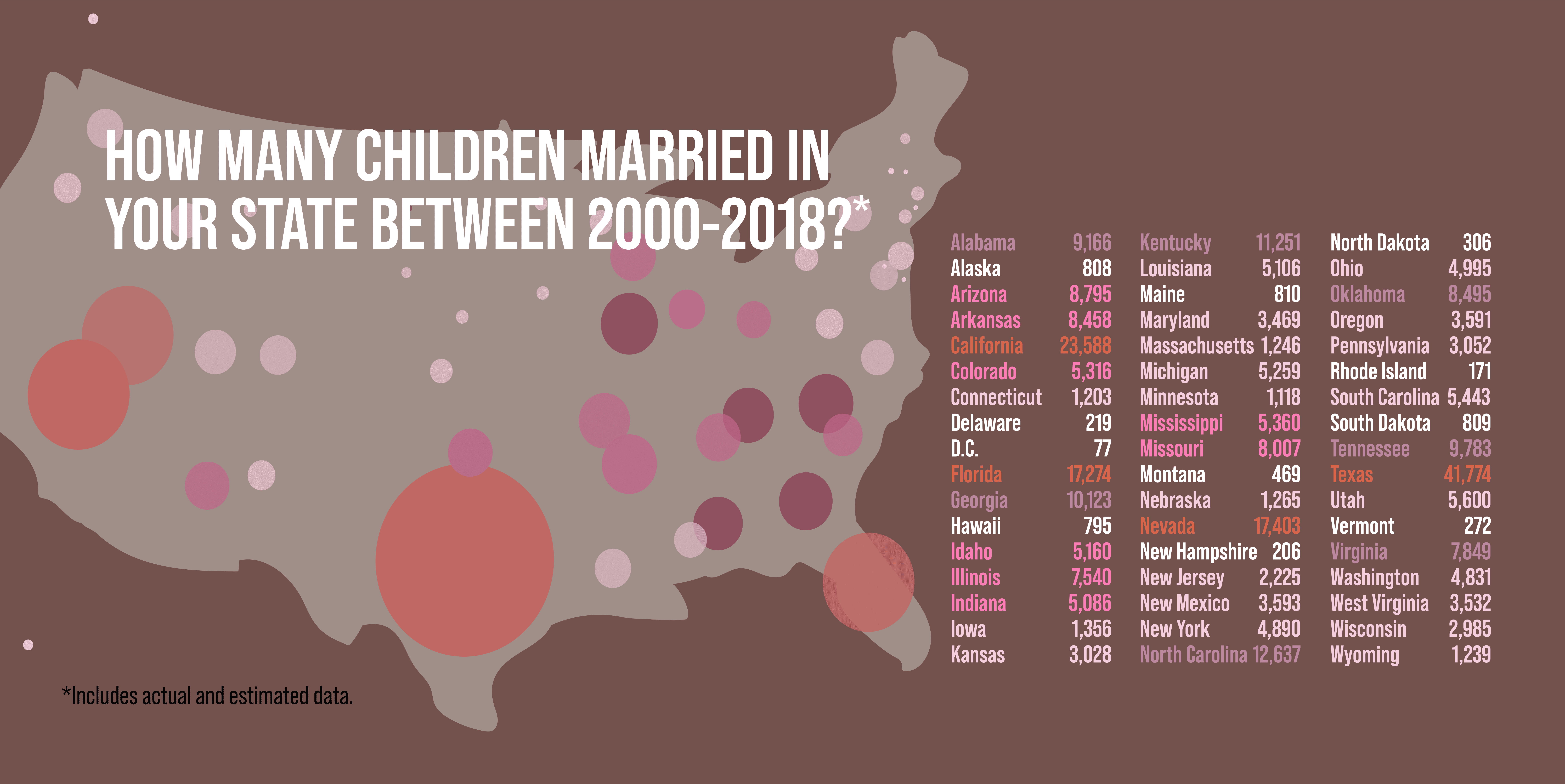
Methodology
Unchained requested marriage-age data, based on marriage certificates, from all 50 states and the District of Columbia. Specifically, Unchained asked for de-identified data on the ages and genders of all people married in the state, along with their spouse’s age and gender, in each year since 2000.
Full Data (32 States)
Unchained retrieved marriage-certificate (or, in some states, marriage-license) data from 32 states that showed the age or age ranges of all individuals married each year between 2000 and 2018. For those states, Unchained analyzed the data to determine how many individuals married before age 18. (A few states provided data for 2019 and part of 2020 as well, but Unchained did not include those years in its national calculations.)
Note that Unchained counted children married, not child marriages. Thus, if a minor married another minor, Unchained counted that as two.
Some states provided data that conflicted with data they previously had provided to Unchained. For those states, Unchained used the newer data, on the assumption that the states had found and corrected errors.
Some states’ data included obvious gaps that mean Unchained’s findings are almost certainly an undercount. For example, Tennessee withheld all counts less than 10 (such as if nine 17-year-olds married 20-year-olds one year), potentially hiding thousands of additional child marriages, and Ohio randomly and irretrievably deleted data on children married before age 15 in most years. Additionally, some states’ data included nonsensical marriage ages, such as three-digit numbers, that Unchained excluded from its analysis.
Unchained confirmed all outliers in the data – that is, children listed as married before age 12 – by contacting the relevant state.
Partial Data (12 States + D.C.)
For 10 states and the District of Columbia, Unchained retrieved marriage-age data for some or most of the years 2000 to 2018. Since the number of children married in each state was highly correlated across years – the correlation ranged from .93 to .99 – Unchained used each of those states’ available data to estimate numbers for the missing years.
For two additional states (Nevada and Arizona), Unchained retrieved full marriage-age data from one county or a pair of counties that represented at least two-thirds of the state population.
No Data (6 States)
To estimate data for the remaining six states and the remaining sections of Nevada and Arizona, Unchained looked for correlations between available marriage-age data in other states and variables in the American Community Survey, the U.S. Census Bureau’s demographics survey program. Unchained identified a strong correlation of .88 with a combination of two ACS variables: already-married individuals age 15 to 17 (they self-reported as married, divorced, widowed or separated) and divorced or separated individuals age 18 to 24. (See Appendix B for a breakdown of which states fit into each methodology category.)
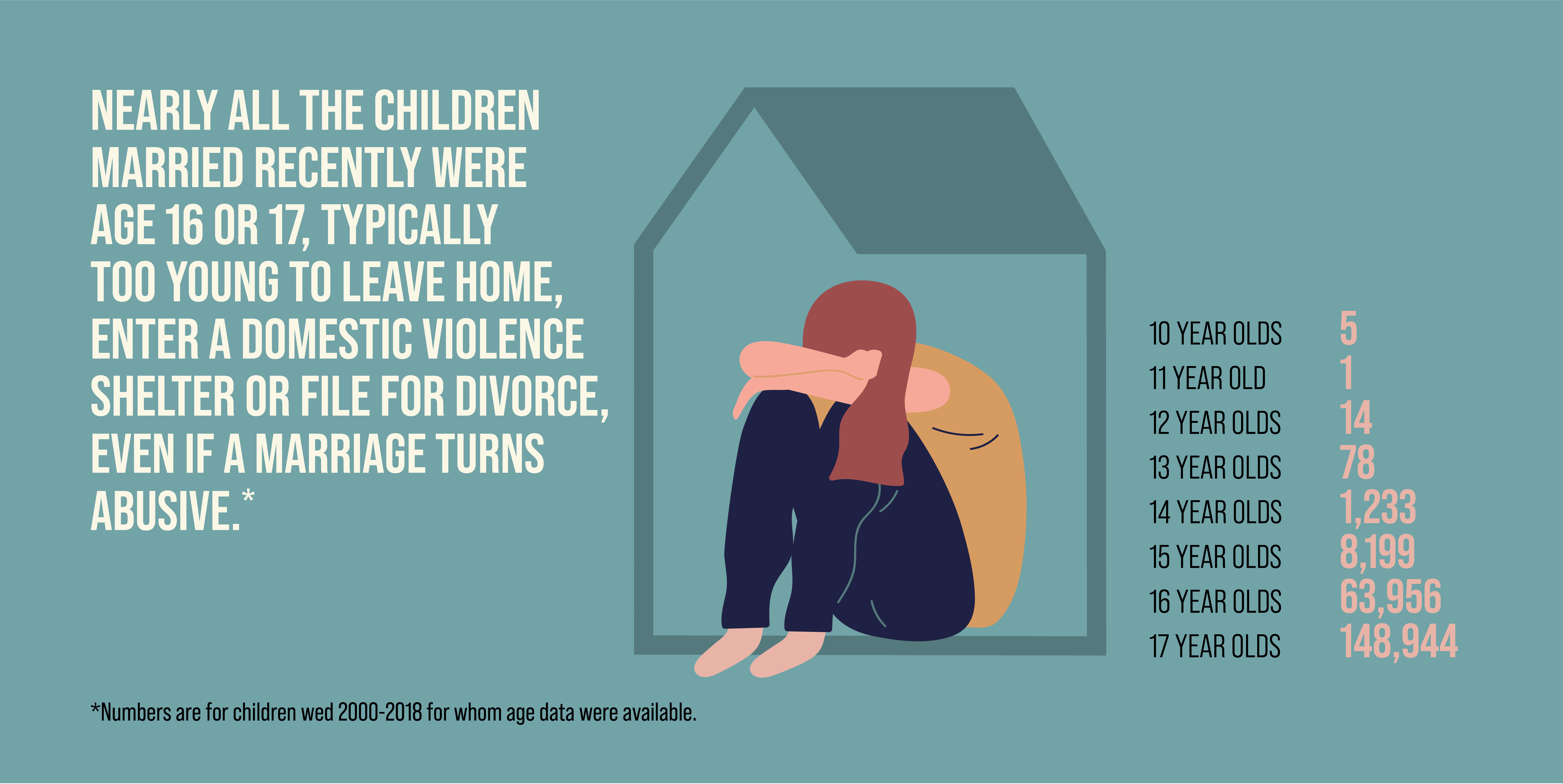
Findings
An estimated 297,033 children were married in the U.S. between 2000 and 2018.
That number includes 232,474 based on actual data plus 64,559 based on estimates.
Child marriage occurred most frequently among 16- and 17-year olds.
Some 96% of the children wed were age 16 or 17, though a few were as young as 10 [5].
10-Year-Olds: 5 (<1%)
11-Year-Olds: 1 (<1%)
12-Year-Olds: 14 (<1%)
13-Year-Olds: 78 (<1%)
14-Year-Olds: 1,223 (<1%)
15-Year-Olds: 8,199 (4%)
16-Year-Olds: 63,956 (29%)
17-Year-Olds: 148,944 (67%)
Child marriage is much more likely to impact girls than boys.
Some 86% of the children who married were girls – and most were wed to adult men (age 18 or older) [6]. Further, when girls married, their average spousal age difference was four years, whereas when boys married, their average spousal age difference was less than half that: 1.5 years [7].
Child marriage often covers up child rape.
Some 60,000 marriages since 2000 occurred at an age or spousal age difference that should have been considered a sex crime [8].
In about 88% of those marriages, the marriage license became a “get out of jail free” card for a would-be rapist under state law that specifically allowed within marriage what would otherwise be considered statutory rape.
In the other 12% of those marriages, the state sent a child home to be raped. The marriage was legal under state law, but sex within the marriage was a crime.
The 10 states with the highest per-capita rates of child marriage [9] are:
1. Nevada (0.671%)
2. Idaho (0.338%)
3. Arkansas (0.295%)
4. Kentucky (0.262%)
5. Oklahoma (0.229%)
6. Wyoming (0.227%)
7. Utah (0.208%)
8. Alabama (0.195%)
9. West Virginia (0.193%)
10. Mississippi (0.182%)
The national number of children married decreased almost every year but is unlikely to get to zero without legislative intervention.
2001: 35,809
2002: 20,542
2003: 18,867
2004: 17,033
2005: 16,871
2006: 14,191
2007: 12,710
2008: 11,421
2009: 10,325
2011: 22,361
2012: 6,962
2013: 5,933
2014: 4,943
2015: 4,275
2016: 3,695
2017: 3,104
2018: 2,493
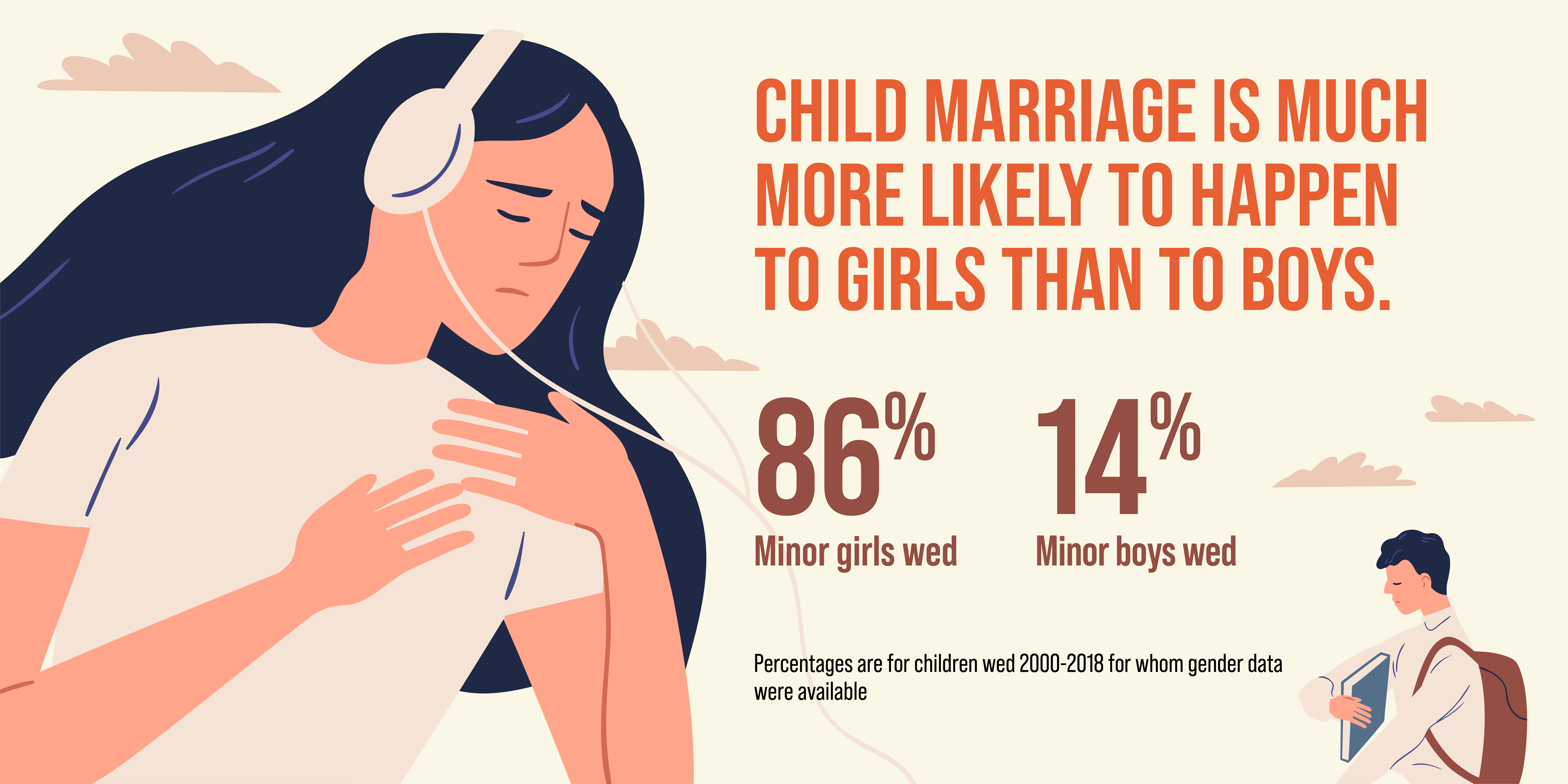
Implications
Policymakers should be deeply concerned about child marriage – including at age 16 or 17 – for three main reasons:
1. Child marriage can easily be forced marriage.
Minors, even highly mature 16- or 17-year-olds, do not have the legal rights they need to navigate a contract as serious as marriage.
Leaving home: Minors who leave home to escape from an abusive spouse or impending forced marriage are typically considered runaways under state law. Police might return them to their homes against their will; in some states, minors can be charged with a status offense for running away. Police might even arrest an advocate at Unchained who helped a minor leave home.
Entering a shelter: A minor who manages to run away from a forced marriage probably has nowhere to go, since Unchained has found that most domestic violence shelters do not accept unaccompanied minors. Youth shelters are not a solution: They typically notify parents their children are there, and house children only for about 21 days while they work on a reunification plan.
Retaining an attorney: Contracts with children, including retainer agreements with attorneys, usually are voidable under state law. Only the most generous attorneys would agree to represent a child.
Filing for divorce: Perhaps most shockingly, children typically are not allowed to initiate a legal proceeding – such as seeking a protective order or filing for divorce – unless they act through a guardian or other representative, under state law.
Some states have tried to close these legal traps by automatically emancipating minors upon their marriage. However, such emancipation arrives too late to prevent a child from being forced to marry; the child must undergo the trauma of the forced marriage before getting the limited legal rights that emancipation brings. And an emancipated minor’s rights are limited: Such a minor still might face difficulties leaving home, entering a shelter or taking other steps to escape an unwanted marriage. Further, automatic emancipation likely ends parents’ financial obligation to their child, regardless of the child’s financial situation. Unchained has seen such teens end up homeless after their marriage failed and their parents refused to allow them back home.
When children reach out to Unchained to ask for help escaping a forced marriage and learn about their limited options, many despair and turn to suicide attempts. Death seems like the only way out for them.
2. Child marriage is a human rights abuse that destroys American girls’ lives.
Marriage before 18, including at 16 or 17, is a human rights abuse, according to the U.S. State Department [10]. It produces devastating, lifelong repercussions for American girls, destroying their education [11], economic opportunities [12] and health [13]. It significantly increases a woman’s risk of experiencing domestic violence [14]. It almost always ends in divorce [15].
Much less is known about the impact of child marriage on American boys. Since most of the children who marry in the U.S. are girls, the research on the impacts of child marriage has been focused on girls.
3. Child marriage undermines statutory rape laws.
In most states and under federal law [16], sex with a child that would otherwise be considered rape – in some cases, felony rape – becomes legal within marriage. In those situations, the marriage license becomes a “get out of jail free” card for a child rapist.
In some states, statutory rape remains a crime within marriage. The marriage is legal, but sex within the marriage is rape. In those situations, the state that issues the marriage license sends a child home to be raped.
As this study showed, 60,000 marriages since 2000 occurred at an age or spousal age difference that should have been considered a sex crime – and 88% gave a rapist a “get out of jail free” card, while 12% sent a child home to be raped. Either way, the state made a mockery of its statutory rape laws.
Child marriage brings no benefit, other than to child rapists. A mature 17-year-old who is in love and wants to marry can wait a matter of months to marry without suffering any harm. A teen couple that gets pregnant can easily co-parent outside of marriage until they are both 18 (establishing paternity is a simple process in most states). A child who is in an abusive home deserves resources and options that do not involve entering a contractual sexual relationship.
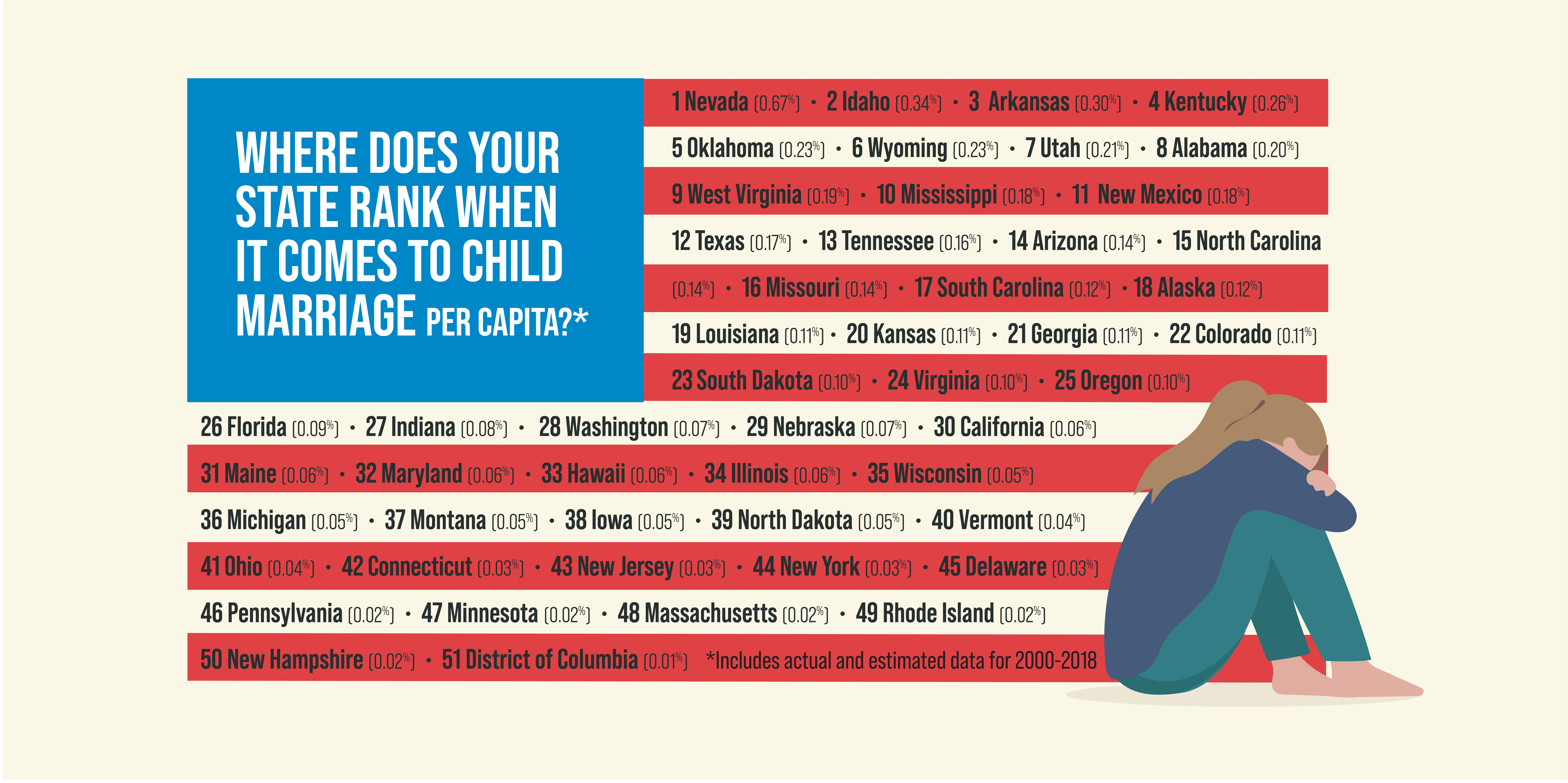
Policy Failures
Unlike in countries such as India, where child marriage is illegal but remains stubbornly widespread due to other factors, the problem in the U.S. is the laws themselves. The nearly 300,000 children wed in the U.S. between 2000 and 2018 all were married legally.

Each U.S. state sets its own marriage age. While most states set it at 18, legal loopholes in most states still allow children to marry, typically with nothing more than a parent’s signature on a form (parental “consent” that is often actually parental “coercion” [17]) and/or a court’s approval (often a rubber stamp [18]). Five states’ laws still specifically allow pregnant girls to marry,* a loophole that has been used to cover up rape and force girls to marry their rapist [19].
Until 2018 – nearly the entire period covered by this study – child marriage was legal in every U.S. state, territory and district. Currently, child marriage remains legal in 46 states, three territories [20] and the District of Columbia, and 10 states’ laws still do not specify any minimum age for marriage** [21]. (See Appendix C for the youngest age at which

one may marry in each U.S. state.)
Federal law, too, allows and might even encourage child marriage. The Immigration and Nationality Act does not specify any minimum age to petition for a foreign spouse or fiancé(e) or to be the beneficiary of a spousal or fiancé(e) visa [22]. This creates a significant incentive to force a child to marry a foreign adult who wants a U.S. visa, and it invites the trafficking of children to the U.S. under the guise of marriage.
U.S. Citizenship and Immigration Services approved 8,868 petitions involving minors for spousal or fiancé(e) entry into the U.S. between 2007 and 2017. The younger party was a girl in 95% of the petitions [23].

Additionally, the federal criminal code, which prohibits sex with a child age 12 to 15, specifically exempts those who first marry the child*** [24]. Refusing to punish child rapists who first marry the child encourages both child marriage and child rape.
Four states and two territories have passed legislation to end all marriage before 18, without exceptions: Delaware [25], New Jersey [26], Pennsylvania [27] and Minnesota [28], as well as American Samoa [29] and U.S. Virgin Islands**** [30]. (Puerto Rico banned marriage before age 18 in 2020 [31]. However, the age of adulthood in Puerto Rico is 21, so Puerto Rico cannot end child marriage unless it sets the marriage age at 21 or lowers the age of adulthood to 18.)
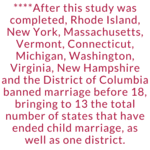
But other states have rejected or watered down legislation to end child marriage, in some cases eliminating one loophole only to introduce a new one, and some states have not acted at all. Bills to eliminate child marriage currently are pending in 12 states, but some have stalled.
Federal legislation to set a minimum age of 18 to remove marriage-related immigration benefits, except Violence Against Women Act self-petitions, for those under 18, was introduced in 2019 but did not get enough support to move [32].
The U.S. is one of 193 countries that have pledged, under the United Nations Sustainable Development Goals (specifically, SDG 5.3) to end child marriage by year 2030 to help achieve gender equality [33]. The U.S. and the world will not be able to keep this promise if legislators do not act now.
Policy Recommendations
Every U.S. state, territory and district must pass simple, commonsense legislation to eliminate any legal loophole that allows marriage before age 18 (or higher, in the three states where the age of adulthood is higher [34]).
Additionally, the federal government must set a minimum age of at least 18 to petition for a spousal or fiancé(e) visa or to be the beneficiary of such a visa, and must eliminate the marital exception to statutory rape.*

Legislation to this effect harms no one except child rapists, costs nothing and protects children from a human rights abuse.
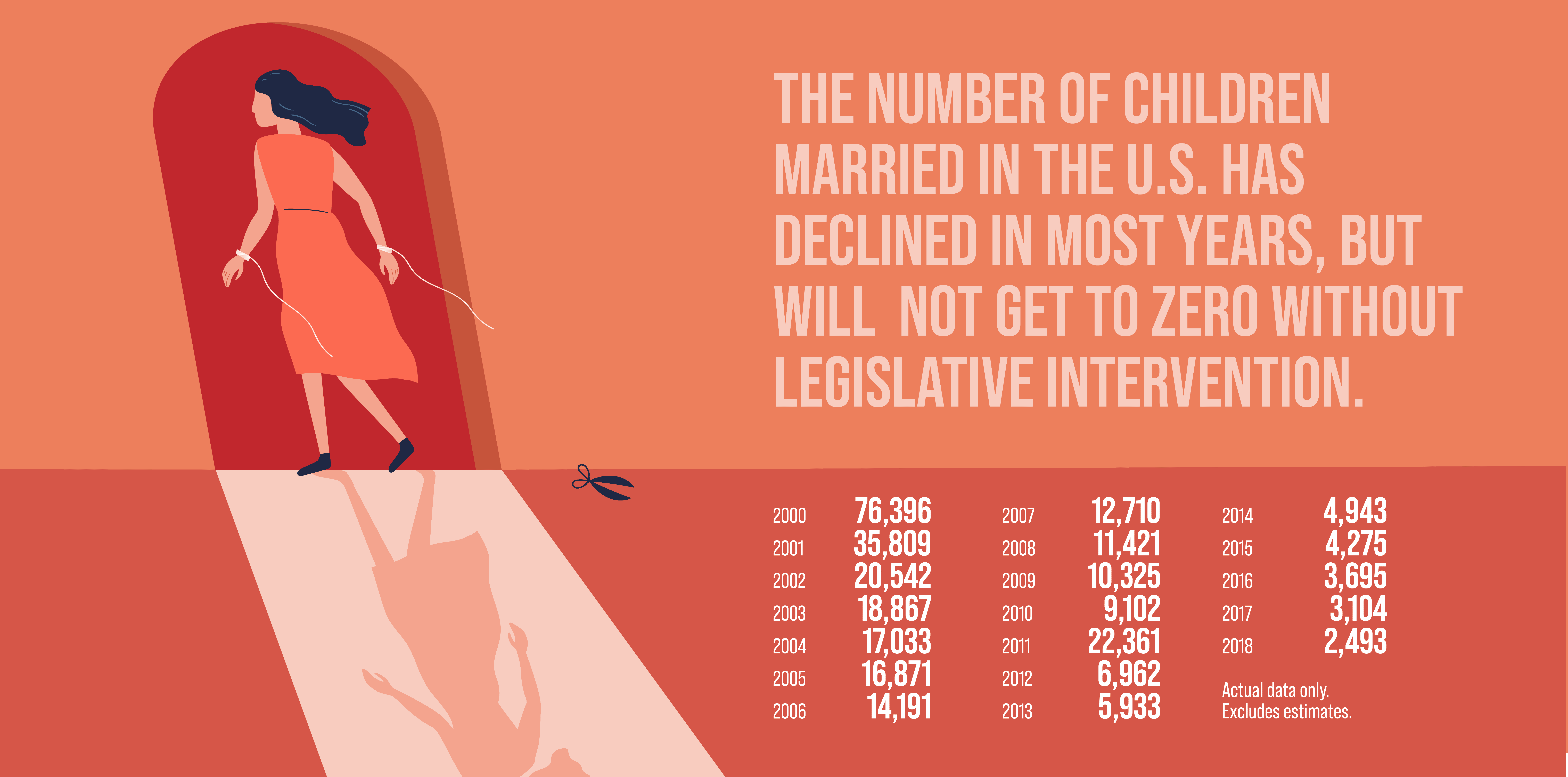
Appendix A: Acknowledgments
Unchained’s partners for this study included:
- Bill & Melinda Gates Foundation, whose generosity made the study possible through a one-year grant;
- McGill University, which conducted the data analyses regarding statutory rape and spousal-age differences;
- Quest Research & Investigations, which conducted most of the data collection and analysis on a “low bono” basis;
- Kroll, which conducted some initial data collection on a pro bono basis;
- Quantitative Analysis, which estimated the data where actual data was unavailable on a pro bono basis;
- J Strategies, which helped publicize the study findings;
- White & Case, which conducted the state-by-state legal research on which some the analysis was based on a pro bono basis;
- TrustLaw, which arranged the “match” between Unchained and White & Case;
- DLA Piper, which conducted legal research on a pro bono basis;
- Morgan Lewis, which conducted legal research on a pro bono basis; and
- DOSIDO Design, which created infographics to illustrate the study’s findings.
Appendix B: Methodology Categories
| Marriage-Certificate Data Retrieved 2000-2018 | Partial Marriage-Certificate Data Retrieved (Years) | Partial Marriage-Certificate Data Retrieved (Counties) | No Marriage-Certificate Data Available | |
| 1 | Alabama | Dist. of Columbia (2010-2018) | Arizona (Pima, Maricopa) | Arizona (Outside Pima, Maricopa) |
| 2 | Alaska | Illinois (2000-2016) | Nevada (Clark*) | California |
| 3 | Arkansas | Indiana (2000-2004, 2010-2018) | Minnesota | |
| 4 | Colorado | Louisiana (2000-2016) | Nevada (Outside Clark) | |
| 5 | Connecticut | Maine (2017-2018) | New Mexico | |
| 6 | Delaware | New York (2000-2010) | North Carolina | |
| 7 | Florida | Oregon (2000-2014) | Oklahoma | |
| 8 | Georgia | Rhode Island (2013-2018) | Pennsylvania | |
| 9 | Hawaii | Texas (2000-2017) | ||
| 10 | Idaho | Utah (2000-2010) | ||
| 11 | Iowa | Washington (2000-2014) | ||
| 12 | Kansas | |||
| 13 | Kentucky | |||
| 14 | Maryland | |||
| 15 | Massachusetts | |||
| 16 | Michigan | |||
| 17 | Mississippi | |||
| 18 | Missouri | |||
| 19 | Montana | |||
| 20 | Nebraska | |||
| 21 | New Hampshire | |||
| 22 | New Jersey | |||
| 23 | North Dakota | |||
| 24 | Ohio | |||
| 25 | South Carolina | |||
| 26 | South Dakota | |||
| 27 | Tennessee | |||
| 28 | Vermont | |||
| 29 | Virginia | |||
| 30 | West Virginia | |||
| 31 | Wisconsin | |||
| 32 | Wyoming |
*Clark County, Nevada, data also was missing the year 2000. Unchained estimated for that year as it did for states whose data missed one or more years.
Appendix C: Marriage Age by State

The youngest age* at which one may marry in each state [35]:

Footnotes
[1] Fraidy Reiss, America’s Child-Marriage Problem, New York Times (13 October 2015), https://www.nytimes.com/2015/10/14/opinion/americas-child-marriage-problem.html.
[2] David Lawson et al., What Does the American Public Know About Child Marriage?, PLoS ONE (23 September 2020), https://doi.org/10.1371/journal.pone.0238346.
[3] Fraidy Reiss, Why Can 12-Year-Olds Still Get Married in the United States?, Washington Post (10 February 2017), https://www.washingtonpost.com/posteverything/wp/2017/02/10/why-does-the-united-states-still-let-12-year-old-girls-get-married.
[4] Anjali Tsui et al., Child Marriage in America, PBS Frontline (6 July 2017), http://apps.frontline.org/child-marriage-by-the-numbers.
[5] Numbers and percentages based on children wed for whom age data were available (actual data only, excluding estimates).
[6] Percentages are based on children wed for whom spousal age and gender data were available (actual data only, excluding estimates).
[7] Calculations of spousal age differences are based on McGill University’s analysis of Unchained’s data (actual data only, excluding estimates) in 43 states.
[8] McGill University’s analysis of Unchained’s data found 34,943 to 40,224 marriages since 2000 occurred at an age or with a spousal age difference that should have constituted a sex crime under the relevant state’s law. In some 80%, sex became legal within marriage; in the other 20%, sex within the marriage was a crime. Unchained added to the analysis the estimated 23,588 children married in California between 2000 and 2018, all of whom fit in the first category.
[9] Per-capita comparison is based on actual and estimated data.
[10] U.S. Department of State, et al., United States Global Strategy to Empower Adolescent Girls (March 2016), https://2009-2017.state.gov/documents/organization/254904.pdf.
[11] Vivian Hamilton, The Age of Marital Capacity: Reconsidering Recognition of Adolescent Marriage, William & Mary Law School Scholarship Repository (2012), http://scholarship.law.wm.edu/cgi/viewcontent.cgi?article=2467&context=facpubs.
[12] Gordon Dahl, Early Teen Marriage and Future Poverty, The National Bureau of Economic Research (May 2005), http://www.nber.org/papers/w11328.pdf.
[13] Yann Le Strat, Caroline Dubertret, Bernard Le Foll, Child Marriage in the United States and Its Association With Mental Health in Women, Pediatrics: Official Journal of the American Academy of Pediatrics (24 August 2011), http://pediatrics.aappublications.org/content/pediatrics/early/2011/08/24/peds.2011-0961.full.pdf.
[14] World Policy Analysis Center, Fact Sheet (March 2015), https://www.worldpolicycenter.org/sites/default/files/WORLD_Fact_Sheet_Legal_Protection_Against_Child_Marriage_2015.pdf.
[15] Vivian Hamilton, The Age of Marital Capacity: Reconsidering Recognition of Adolescent Marriage, William & Mary Law School Scholarship Repository (2012), http://scholarship.law.wm.edu/cgi/viewcontent.cgi?article=2467&context=facpubs.
[16] 18 U.S.C. § 2243 calls for up to 15 years in prison and/or a fine for someone who has sex with a child age 12 to 15, if the child is at least four years younger.
[17] In Unchained’s experience, even when a minor shows up sobbing at the clerk’s office while their parents force them to marry, the clerk is unwilling or unable to intervene.
[18] In Unchained’s experience, minors being forced to marry are too scared to tell the judge about it. Additionally, this study shows judges across the U.S. have approved marriages for children who are too young to consent to sex. Further indication that judges are not paying close attention is a report that showed Massachusetts probate judges approved 92% of child marriage petitions between 2010 and 2014. See Jim Morrison, Advocates Raise Concerns About Child Marriage in Mass., Boston Globe (10 August 2016), https://www.bostonglobe.com/metro/2016/08/10/advocates-raise-concerns-about-child-marriage/sx4TQNbXp4gimy502yWB4L/story.html.
[19] The five states with a pregnancy exception to the marriage age are Arkansas (Arkansas Code Annotated § 9-11-103), Maryland (Maryland Family Law Code Ann. § 2-301), New Mexico (New Mexico Code § 40-1-6), North Carolina (North Carolina General Statutes § 51-2.1) and Oklahoma (Oklahoma Statutes Ann. § 43-3). For an example of how pregnancy loopholes have been used to cover up rape and force girls to marry their rapist, see: Nicholas Kristof, 11 Years Old, a Mom, and Pushed to Marry Her Rapist in Florida, New York Times (26 May 2017), https://www.nytimes.com/2017/05/26/opinion/sunday/it-was-forced-on-me-child-marriage-in-the-us.html. (CORRECTION: A previous version of this study said that four states as of April 2021 included a pregnancy exception to the marriage age, which excluded Arkansas. This was corrected as of April 2022.) *NOTE* After this study was completed, North Carolina changed its laws, reducing to four the number of states with a pregnancy exception to the marriage age: Arkansas, Maryland, New Mexico and Oklahoma.
[20] Puerto Rico banned marriage before age 18 in 2020 with PC1564. See https://sutra.oslpr.org/osl/esutra/MedidaReg.aspx?rid=124126. However, the age of adulthood in Puerto Rico is 21, so Puerto Rico cannot end child marriage unless it sets the marriage age at 21 or lowers the age of adulthood to 18. *NOTE* After this study was completed, Rhode Island, New York, Massachusetts, Vermont, Connecticut, Michigan and Washington ended child marriage. Now child marriage is legal in 39 states, and four states do not specify a minimum marriage age.
[21] The 10 states whose laws do not specify any minimum age for marriage are California, Massachusetts, Michigan, Mississippi, New Mexico, Oklahoma, Rhode Island, Washington, West Virginia and Wyoming. *NOTE* After this study was completed, Rhode Island, Massachusetts, Michigan and Washington, which previously did not specify a minimum age for marriage, ended child marriage. Additionally, Wyoming and West Virginia raised their age to 16 from 0. Currently, four states’ laws do not specify a minimum marriage age: California, Mississippi, New Mexico and Oklahoma.
[22] 8 U.S.C. § 1101.
[23] U.S. Senate Committee on Homeland Security and Governmental Affairs, How the U.S. Immigration System Encourages Child Marriages (11 January 2019), https://www.hsgac.senate.gov/imo/media/doc/Child%20Marriage%20staff%20report%201%209%202019%20EMBARGOED.pdf.
[24] 18 U.S.C. § 2243 calls for up to 15 years in prison and/or a fine for someone who has sex with a child age 12 to 15, if the child is at least four years younger. *NOTE* The Violence Against Women Reauthorization Act of 2022 — which President Biden signed into law in March 2022 — eliminated this marriage defense to statutory rape. However, another marriage defense to statutory rape remains in the federal code under 10 U.S.C. § 920b.
[25] HB337 (2018). https://legis.delaware.gov/BillDetail?LegislationId=26363.
[26] S427 (2018). https://www.njleg.state.nj.us/2018/Bills/AL18/42_.HTM.
[27] HB360 (2020). https://www.legis.state.pa.us/cfdocs/billInfo/billInfo.cfm?sYear=2019&sInd=0&body=H&type=B&bn=0360.
[28] HF745 (2020). https://www.revisor.mn.gov/bills/bill.php?f=HF745&y=2019&ssn=0&b=house.
[29] HB35-28 (2018). Not available online.
[30] Bill No. 33-109 (2020). https://www.legvi.org/billtracking/Detail.aspx?docentry=27003.
[31] PC1564 (2020). https://sutra.oslpr.org/osl/esutra/MedidaReg.aspx?rid=124126.
[32] S.742/H.R.1738: Protecting Children Through Eliminating Visa Loopholes Act (2019-2020). https://www.congress.gov/bill/116th-congress/senate-bill/742/text and https://www.congress.gov/bill/116th-congress/house-bill/1738/all-info.
[33] United Nations Sustainable Development Goal 5 is to “achieve gender equality and empower all women and girls.” One aspect of that, Goal 5.3, is to “eliminate all harmful practices, such as child, early and forced marriage and female genital mutilation.” https://sdgs.un.org/goals/goal5.
[34] The age of adulthood is 19 in Alabama (Code of Alabama, Title 26, Chapter 1, § 26-1-1); 21 in Mississippi (Mississippi Code Ann. § 1-3-27); and 19 in Nebraska (Nebraska Code § 43-2101).
[35] Marriage age is based solely on statute, not on case law. *NOTE* After this study was completed, Rhode Island, New York, Massachusetts, Vermont, Connecticut, Michigan and Washington ended child marriage. (The youngest marriage age allowed in those states is now 18.) Additionally, North Carolina and Alaska raised their marriage age to 16 from 14, Maryland raised its age to 17 from 15, Maine raised its age to 17 from 16, and Wyoming and West Virginia raised their age to 16 from 0.
xxxxxxxxxxxxxxxxxxxxxxxxx
Help End Child Marriage

UNICEF USA is working with partners to put an end to child marriage in the United States. Learn more and how to help.
Why UNICEF USA is taking action to end child marriage
UNICEF defines child marriage as a harmful practice and a violation of child rights, and believes that marriage under age 18 should be prohibited in all circumstances, everywhere. Girls who marry are not only denied their childhood, they are often socially isolated, with limited opportunities for education and employment.
Before COVID-19 hit, more than 100 million girls were expected to marry before their eighteenth birthday in the next decade. As a result of the pandemic, 13 million more girls may be at risk of becoming child brides.
In the U.S., there is no federal law regarding child marriage. Each state establishes its own requirements, and some have set no minimum age for marriage. Connecticut, Delaware, Massachusetts, Michigan, Minnesota, New Jersey, New York, Pennsylvania, Rhode Island, Vermont and Washington are the only states that have outlawed marriage before age 18, with no exceptions.
UNICEF USA, a member of the National Coalition to End Child Marriage, is working alongside other NGO partners to end marriage below the age of 18 within the U.S. and to repeal loopholes and exceptions that may promote the practice. As part of that effort, UNICEF USA and Zonta International have joined forces to raise awareness and enact change to end child marriage both in the U.S. and around the world.
No comments:
Post a Comment